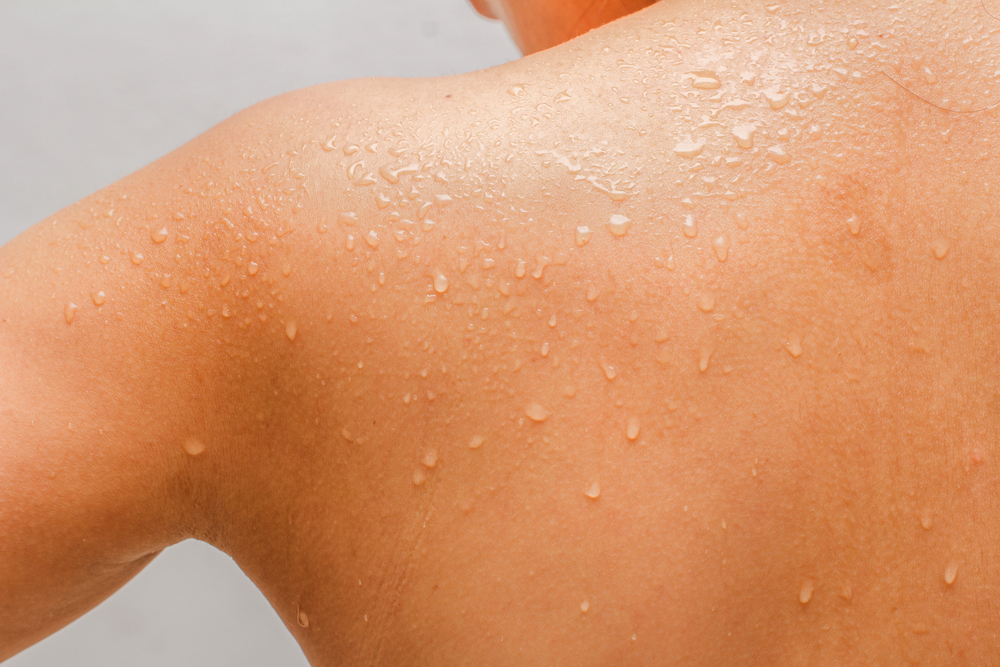For many of us, we avoid sweating. When we do sweat, we usually make a great effort to conceal it. Yet sweating is vital to our health, just as it was for our ancestral humans. The ability to perspire while hunting in a hot environment enabled humans to adapt, survive, and become proficient hunter-gatherers.
Ritual sweating was also used for therapeutic and cleansing purposes and for spiritual and emotional healing. Celtic vapor baths, North American sweat lodges, and Scandinavian saunas are all traditions from long ago that have been adapted in modern times for their health and healing benefits.

Why We Sweat and Why It’s Healthy
Though sweating is often underappreciated, it’s important to know why we do it. Our skin, which is the largest organ, is essentially our third kidney. Sweat glands help our skin filter toxins out of the body, which in turn boosts our immune system. Sweating also cools our body and maintains proper body temperature. However, there are two distinct ways in which we sweat: The eccrine glands produce sweat to regulate body temperature and are found all over our body. The apocrine glands are linked to hair follicles (e.g., underarms) and primarily produce sweat triggered by emotional stressors, like fear and anxiety, along with body odor. When we do sweat all over, as with intense exercise, good things happen to our body:
- circulation increases throughout our organs, muscles, and tissue
- our skin releases certain toxins, like alcohol and waste products, to help our bodies detoxify
- the elimination of salt from the body can help prevent kidney stones from forming
- prolonged sweating also leads to increased thirst and the need to drink more water, which is also helpful in lowering the risk of kidney stones
- the pores on our skin open up and allow for a protective barrier to form against pathogens, reducing bacteria on the skin (this can benefit many skin problems like acne)
Wiseman Health Take-Home Advice
Before heavy sweating in a sauna, other heated environment, or with strenuous exercise, check with your medical provider first to discuss any potential risks due to medical health conditions.
- One of the best ways to increase sweat production is to exercise, whether it is moderate or intense activity. We encourage you to exercise outdoors as much as possible, especially when it’s warm outside. This natural approach exposes your skin to sunlight and facilitates the production of vitamin D. Sweating unclogs pores, which in turn helps you synthesize vitamin D more efficiently. Remember, the more you exercise, the quicker you sweat.
- Exercising in a heated room (e.g., Bikram yoga and other hot yoga) promotes sweating; however, use caution when exercising in a heated environment and take it slow if you are just starting out. As with any kind of exercise, be sure to stay hydrated during and after physical activity.
- Saunas are an excellent way to promote all-over sweating and are used for detoxification and disease-prevention. Saunas help kill viruses and can release toxins on a cellular level, which is important to think about considering how often we are exposed to chemicals and toxins in our environment, food, and the products we use. There are basically two kinds of saunas: 1) Infrared saunas use infrared light as radiant heat (but at a lower temperature), essentially penetrating and heating your body tissue. 2) Traditional saunas (Finnish-style saunas) use higher temperatures to heat up an area, thus heating the body from the outside in. To help detoxify your body, use a sauna one to two times a week and for up to 10–20 minutes once you start sweating. (Be sure to limit sauna use to once or twice a week.) It’s important to hydrate with spring water when you are in the sauna and continue rehydrating with it afterwards, as spring water helps replenish electrolytes. When finished with the sauna, be sure to take a shower to remove the residue, toxins, and impurities on your skin. Affordable home saunas can be found online and are a convenient and sustainable option, or find a local sauna studio, gym, or wellness spa that specializes in infrared sauna sessions.
- Heavy sweating is a great way to facilitate your body’s natural ability to detox. Adding a high-quality detox supplement along with eating clean foods and drinking purified water can also help optimize your body’s detoxification process. Our Wiseman Health Liver Support is specifically formulated to support and enhance the hepatic detoxification process, and our Wiseman Health Detox Support helps neutralize and remove harmful toxins from the body.
- Avoid using antiperspirants because they block sweat and also contain unhealthy aluminum-based compounds and drying agents. Use natural deodorants that do not clog pores and do not contain aluminum or alum in the ingredients.
For more on skin, exercise, sunlight, and a list of healthy, natural deodorants, see our Preventive 10.
Editor’s Note: This content was created by our Wiseman Health content and writing team, without the influence of artificial intelligence engines. Our goal is to be your trusted source for natural health and medical information. This article was originally published on February 1, 2017 and has since been updated.
Powell, A. (2007, April 19). Humans hot, sweaty, natural-born runners. news.harvard.edu. Retrieved on February 08, 2017 from http://news.harvard.edu/gazette/story/2007/04/humans-hot-sweaty-natural-born-runners/
Crinnion, WJ. (2011, September 16). Sauna as a valuable clinical tool for cardiovascular, autoimmune, toxicant- induced and other chronic health problems. ncbi.nlm.nih.gov. Retrieved on February 08, 2017 from https://www.ncbi.nlm.nih.gov/pubmed/21951023
Ravensthorpe, M. (2013, August 27). The many health benefits of sauna bathing. naturalnews.com. Retrieved February 08, 2017 from http://www.naturalnews.com/041793_sauna_bathing_health_benefits_natural_detox.html
Genuis et al., (2011, August 16). Blood, urine, and sweat (BUS) study: monitoring and elimination of bioaccumulated toxic elements. ncbi.nlm.nih.gov. Retrieved on February 08, 2017 from https://www.ncbi.nlm.nih.gov/pubmed/21057782
Borreli, L. (2014, November 07). Sweat It Out! 5 Surprising Health Benefits Of Sweating That Actually Don’t Stink. medicaldaily.com. Retrieved on February 08, 2017 from http://www.medicaldaily.com/sweat-it-out-5-surprising-health-benefits-sweating-actually-dont-stink-309718
